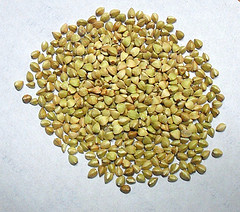 Originated in Asia and grown since at least 1000 BC in China; widely adapted in the northern hemisphere with strong adaptability to adverse environments and a very short growing span. Most common buckwheat is Fagopyrum esculentum Moench (common or sweet buckwheat); Fagopyrum tartaricum is available in some mountainous regions.
Originated in Asia and grown since at least 1000 BC in China; widely adapted in the northern hemisphere with strong adaptability to adverse environments and a very short growing span. Most common buckwheat is Fagopyrum esculentum Moench (common or sweet buckwheat); Fagopyrum tartaricum is available in some mountainous regions.
Nutrition: Buckwheat contains many nutraceutical compounds and is an important raw material for functional food production. Research has be conducted in the functionalities and properties of buckwheat proteins, flavonoids, flavones, phytosterols, thiamin-binding proteins, and other rare compounds in buckwheat seeds. Contains flavinoids orientin, isoorientin, vitexin, isovitexin, rutin, quercetin and isoquercetin whereas tartary buckwheat only contains rutin. High in magnesium, phosphorus and potassium, catechin and epicatechin phenolic compounds. Flavinoids and polyphenols are responsible for its antioxidant properties.
Science:
Allergy: is more common in Asia, especially Japan and Korea causing asthma and contact dermatitis; common in Denmark and reported in Italy, rare in UK; can cause life-threatening anaphylaxis. Further study is needed.
Anti-fungal: peptide was found in buckwheat and inhibited proliferation of hepatoma (liver), leukaemia, breast cancer and liver embryonic cells.
Anti-inflammatory: properties shown in human colon cancer cells.
Antioxidant: capacity of quercetin was strongest in a biological response system.
Cancer: Used in China to treat lung ailments, including tumours. The gene of buckwheat trypsin inhibitor may be a potential benefit in the treatment of cancer. Inhibited growth of cancer cells from lung, liver, colon, leukocytes and bone, though not cancer cells from prostate, cervix, ovary and brain; tatariside may be an effective candidate against cervical cancer; it retarded mammary carcinogenesis by lowering serum estradiol and an anti-tumour protein was isolated in buckwheat against breast cancer yet another study showed that buckwheat extract stimulates growth of breast cancer cells. Buckwheat hull was shown to have anti-cancer properties against a variety of different cancer cell lines. Antioxidant properties showed photoprotection against skin cancer.
Cardiovascular: protective due to antioxidant properties; potential in treatment against hypertension.
Cholesterol: lowering effects due to unique amino acid composition; reduced serum total cholesterol and triglyceride in hyperlipidaemic rats, particularly the protein.
Constipation: improved due to fibre content.
Diabetes: Antihyperglycaemic, prevention of type 2 diabetes, gastrointestinal satiety. Three flavonoids from tartary buckwheat bran, quercetin, isoquercetin and rutin have been evaluated as alpha-glucosidase inhibitors by fluorescence spectroscopy and enzymatic kinetics and have also been compared with the diabetes drug acarbose.
Gallstones: preventative; suppresses formation of cholesterol induced gall stones and body fat in rodents.
Gluten Free -Celiac friendly: helps prevent nutritional deficiencies in celiac people, may be an important part of a gluten free diet, non toxic for gluten free patients.
Obesity: strong properties against hypercholesterolemia, obesity and gallstone formation.
Adding Buckwheat to your Diet: Use buckwheat groats as an alternative to rice and porridge; pasta is totally yummy. Cook well to avoid poor digestion as trypsin inhibitors in buckwheat are heat stable.
A slightly naughty mostly healthy pasta recipe:
Ingredients: Buckwheat pasta, pepper cheese, spinach (broken into pieces). Optional onions, garlic, other vegetables.
Method: Cook pasta covered in boiling water; when nearly done and only a little water left, add cheese and as much spinach as you can tolerate.
Optional Extras to add while cooking pasta: Chopped onion, leeks, broccoli, garlic, paprika, black pepper.
Serve surrounded with green leaves, sprinkle with parmesan cheese, olive oil and balsamic vinegar.
We are happy to advise you on your health matters.
 Lin Bridgeford DO KFRP MSCC ICAK (UK) MSc
Lin Bridgeford DO KFRP MSCC ICAK (UK) MSc
Registered Osteopath & Kinesiologist & Yoga Teacher
Aether Bios Clinic
Saltdean
01273 309557
07710 227038
